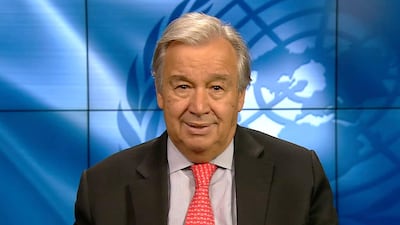The departure of President Donald Trump has led the UN secretary general to seek a second term in office, diplomatic sources said.
It is understood that Antonio Guterres was awaiting the outcome of the US presidential election before making his decision.
With Mr Trump creating considerable difficulties for the global body, his defeat to Joe Biden in the US presidential election has led to the 71-year-old former Portuguese prime minister seeking a second five-year term.
Mr Guterres told the Security Council and the president of the 193-member General Assembly on Monday that he seeks a second five-year term at the helm of the world body, according to a letter seen by Reuters.
His first term finishes at the end of this year.
In a letter to the Security Council and General Assembly President Volkan Bozkir, Guterres said: "It would be my honour to continue to serve the Organisation in pursuing its purposes and fulfilling its noble objectives."
"Since assuming office, I have had the privilege of working towards the reform of the United Nations to meet the aspirations of member states, striving for the dignity and the well-being of people, while ensuring the sustainability of our planet for future generations," Mr Guterres wrote.
He said he was ready to submit a vision statement for his second term to the General Assembly and take part in an informal discussion with member states. Mr Guterres was responding to a January 8 letter from Mr Bozkir that asked his intentions.
Mr Guterres managed to avoid direct confrontation with Mr Trump despite the president withdrawing from the World Health Organisation at the height of the Covid-19 pandemic and removing the US from the Paris Agreement on climate change and the Iran nuclear deal.
Despite the US having a permanent seat on the UN Security Council and considerable influence, Mr Trump chose to criticise the institution calling the Human Rights Council a “grave embarrassment”.
Mr Guterres managed to navigate the UN through these challenges without provoking the departing US president, although early in his tenure the secretary general did warn that America’s values could be replaced on the world stage when questioned about Mr Trump’s approach.
“I believe that if the United States disengages in relation of many aspects of foreign policy, it will be unavoidable that other actors will occupy that space,” he said in 2017. “And I don't think this is good for the United States and I don't think this is good for the world.”
His nimble diplomacy means he is now highly likely to be re-elected, endorsed by the five permanent members of the Security Council.
Mr Guterres took office as the ninth secretary general in January 2017 for a five-year term that finishes at the end of this year.
His request for a second stint is likely to be supported by Mr Biden who has pledged to reverse Mr Trump’s isolationist approach by returning to the WHO, repairing the Iran nuclear deal and rejoining the Paris climate accord.
Mr Guterres has made climate change a key issue, urging countries to reduce their carbon emissions. His position will be further enhanced when Mr Biden’s pick for UN ambassador Linda Thomas-Greenfield takes post.
Mr Biden said the experienced diplomat “recognises the extraordinary impact of climate change and the crucial role the United States plays in finding a solution to this crisis”.
With the president-elect and Mr Guterres strongly aligned over environmental issues, the US will be a firm backer for a second term that will likely be supported by the other permanent Security Council members Russia, Britain, China and France.
There has been criticism of the permanent five’s influence on selection of the secretary general and in December last year Costa Rica and Denmark, writing on behalf of 25 countries, urged the UN to ensure that the “upcoming selection process” meets the “minimum standards of transparency”.


